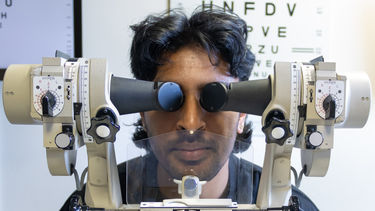Being an orthoptist is incredibly rewarding, and as the BMedSci Orthoptics course lead I’ve been privileged to hear the many inspiring reasons that bring students to the University of Sheffield
Our students are passionate about making a difference in patients’ lives, and improving someone’s sight can be transformative. Imagine giving an adult patient with disabling double vision the ability to read and drive again. Some of our students have experienced this type of care themselves and I’m awed by their dedication to give back.
The field of orthoptics continues to expand to face new challenges. We’re a small but growing profession, and there are so many exciting career opportunities within clinical practice, research, management or teaching that I can’t wait for you to explore.
Because the profession is so dynamic, we need to be dynamic too. The standards of proficiency released by the Health and Care Professions Council (HCPC) in 2023 gave us the chance to step back, reflect on what we’re doing well, and make changes to our BMedSci Orthoptics programme to benefit the orthoptists of tomorrow.
So what’s changed?
First things first - we’re not reinventing the wheel.
Sheffield students regularly tell us how much they love our course, particularly the time they spend on placements. Our graduates already meet the new HCPC proficiencies, and we’re excited to see the paths they forge for themselves in the coming years. So, while the content of our programme doesn’t need to change, we’ve consulted with staff, students and examiners to deepen our offering to meet the ever-changing needs of the profession.
Preparing you for extended roles
I think [extended roles are] the future of orthoptics; the population is growing and eyes are getting older, but the workforce of ophthalmologists isn’t getting any bigger. So I think the solution is for allied health professionals to upskill [...] to fill those gaps.
Alis Sejourne
Orthoptist and University of Sheffield graduate
With an ageing population and a UK-wide shortage of specialist eye care professionals, the gap between patients’ need for appointments and clinic capacity is widening. Because of this, the NHS wants to upskill orthoptists so they can contribute to specialist services. Orthoptists like Alis are taking on extended roles in places like stroke wards or low vision clinics, or independently treating ophthalmology patients following Advanced Clinical Practice (ACP) training.
To prepare you for the types of roles that lie ahead, we’ve embedded more of these higher-level skills into the second year of the programme. We’ve also introduced a new module on the sale, supply and administration of medicine or therapeutic products such as eye drops or injections which can be beneficial to diabetic patients.
Sheffield also offers a specialist Vision and Strabismus master’s degree and ACP Paediatric Ophthalmology training. We’ll introduce you to our postgraduate team and qualified orthoptists during your studies so you can find out more about the pathways available after graduation.
Developing your research skills
As the University of Sheffield is a Russell Group university and very involved in research, I always knew that I would like to get involved in academia. When this opportunity came around and in a field that I would be very knowledgeable about by the end of my degree, I knew that my thoughts and opinions could have a big impact on the research.
Zahra Hussain
Second-year BMedSci Orthoptics student
Throughout our course you’ll be taught by world-leading researchers who have made substantial contributions to the field. This research not only advances our understanding of vision and the human eye but helps us make informed decisions about our patients’ care.
We already incorporate the latest findings into our teaching, but new students will also benefit from a brand new research methods module in year two of the programme. This module will help you develop vital analytical skills, enabling you to critically evaluate research and build an evidence-based practice.
The module is also excellent preparation for your final year research project, something a lot of our students really enjoy. Projects are designed by students, who go on to collect ‘real time’ data. This is a unique feature of the Sheffield Orthoptics degree – previous Sheffield students have even gone on to publish their findings, and pursue further study at master’s and PhD level.
From the classroom to the clinic
[Placements] give me plenty of opportunities to see real life patients with actual problems, allowing the theoretical and practical sides of the course to merge.
Shasshen L
Third-year BMedSci Orthoptics student
It’s important to us that our students have a say in how we deliver our programme, and I’m thrilled that both staff and students share the same vision when it comes to the future of the course.
One aspect of the course students asked us to develop is the link between what you learn in the classroom, and how you apply it to the clinic. We’ve reviewed our material to incorporate more real-life cases, so you can make connections between the theory you’re taught and what you see on placement.
The HCPC also emphasises the importance of reflective practice, which I’m proud to say our students already excel at. During clinical placements students complete a portfolio to record what they’ve learnt, how it applies to practice, and areas for improvement. Students tell us this is incredibly valuable, so you’ll see more of this proactive approach to reflection going forward. On top of the placement portfolio, we’re introducing a wider range of assessments including case reports, peer-assessed presentations, and patient examinations, to evaluate your learning in a more holistic way.
We’ve also introduced an associated professional studies module in level 1, where you’ll learn about medical ethics and the dilemmas you might come across in clinical practice. This module will also introduce you to the structure of the NHS and our role as orthotists as part of a multidisciplinary team. This module will help consolidate your learning, and prepare you for the rewarding, and challenging, life of an orthoptist.



